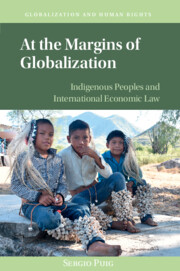Book contents
- At the Margins of Globalization
- Globalization and Human Rights
- At the Margins of Globalization
- Copyright page
- Dedication
- Contents
- Tables
- Preface and Acknowledgments
- Introduction
- 1 Globalization and Its Multiple Discontents
- 2 The Process of Susceptibility and Exclusion
- 3 Indigenous Peoples under International Economic Law
- 4 The Experience of Indigenous Peoples under Economic Regimes
- 5 The Recalibration of Indigenous Rights and Economic Law
- 6 Indigenous Interests and the Future of Economic Treaties
- 7 Toward an Indigenous-Based Critique of Globalization
- Conclusion
- Index
- Series page
5 - The Recalibration of Indigenous Rights and Economic Law
Published online by Cambridge University Press: 23 April 2021
- At the Margins of Globalization
- Globalization and Human Rights
- At the Margins of Globalization
- Copyright page
- Dedication
- Contents
- Tables
- Preface and Acknowledgments
- Introduction
- 1 Globalization and Its Multiple Discontents
- 2 The Process of Susceptibility and Exclusion
- 3 Indigenous Peoples under International Economic Law
- 4 The Experience of Indigenous Peoples under Economic Regimes
- 5 The Recalibration of Indigenous Rights and Economic Law
- 6 Indigenous Interests and the Future of Economic Treaties
- 7 Toward an Indigenous-Based Critique of Globalization
- Conclusion
- Index
- Series page
Summary
This chapter provides the assessment of the intersection – that between international economic law and indigenous rights – coined in this book as international indigenous economic law. The author asserts that there is an important place for indigenous rights within the field of international economic law. Indeed, an international indigenous economic law, one that focuses on the vulnerable and marginalized, can provide a limited yet important pathway for improving the unequal distribution of the benefits of globalization and for moving beyond the standard conversations among mainstream and classical economists and policymakers that the redistribution of wealth and power should be purely domestic policy responses. This claim has implication for international economic law and indigenous rights scholars alike.
- Type
- Chapter
- Information
- At the Margins of GlobalizationIndigenous Peoples and International Economic Law, pp. 104 - 125Publisher: Cambridge University PressPrint publication year: 2021

